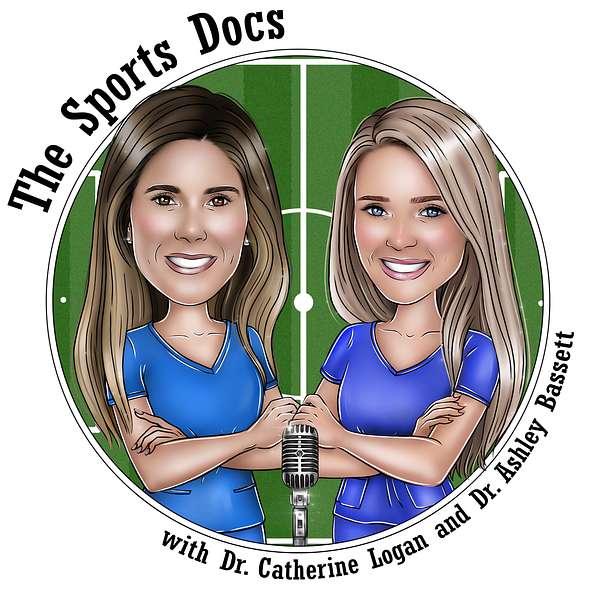
The Sports Docs Podcast
Sports medicine is a constantly evolving field, with hundreds of new articles published each month on the topic. This ever-growing wealth of information can make it challenging to stay updated on the newest approaches and techniques, and to know which data should actually change your practice. Join orthopedic surgeons, Dr. Catherine Logan and Dr. Ashley Bassett, as they chat about the most recent developments in sports medicine and dissect through all the noise.
On each episode of The Sports Docs podcast, the hosts will tackle a specific injury – from ACL tears to shoulder instability – and review the top research from various high-impact journals that month, including The American Journal of Sports Medicine, Arthroscopy: The Journal of Arthroscopic and Related Surgery, Sports Health, Journal of Shoulder and Elbow Surgeons, and more. The Sports Docs will also be joined by experts in the field of sports medicine – orthopedic surgeons, nonoperative sports medicine specialists, athletes, physical therapists, athletic trainers and others – to provide a fresh and well-rounded perspective based on their unique experiences.
The Sports Docs – Dr. Logan & Dr. Bassett – are friends & former co-residents from the Harvard Combined Orthopaedic Residency Program, who went onto esteemed sports medicine fellowships at The Steadman Clinic and The Rothman Institute, respectively. Dr. Logan practices in Denver, CO, and serves as Team Physician for Men's USA Lacrosse & as a Team Physician for U.S. Ski & Snowboard. Dr. Bassett is the director of the Women’s Sports Medicine Center at the Orthopedic Institute of New Jersey and practices across northern NJ, primarily in Morris and Sussex Counties.
Together, they will bring monthly conversations on how to care for athletes of all ages and levels of play, with a healthy mix of cutting-edge science and real-world application.
The Sports Docs Podcast
109: Dr. Patrick Denard – Treatment of Challenging Rotator Cuff Pathology (Part 1)
On today’s episode we’re focusing on challenging rotator cuff pathology with Dr. Patrick Denard, an orthopedic shoulder surgeon at the Oregon Shoulder Institute. We have some great articles for you that contribute well to our conversation on the treatment options for massive reparable, as well as irreparable, rotator cuff injuries. As always, links to all of the papers that we discuss on this show can be found on our podcast website – www.thesportsdocspod.com
We’ll start off our discussion today with an expert opinion article from the July 2022 issue of Arthroscopy titled “Graft Augmentation of Repairable Rotator Cuff Tears: An Algorithmic Approach Based on Healing Rates.” Authored by our guest today, this article provides an algorithm for tissue augmentation of rotator cuff repairs based on the current available evidence regarding rotator cuff healing. The authors recommend using a Rotator Cuff Healing Index or “ROHI” cutoff of greater than or equal to 7 to select for the use of tissue augmentation, as the healing rate is 66% at 6 points but decreases substantially to 38% at 7 points.
Then, from the May 2019 issue of AJSM, we review an article titled “Rotator Cuff Matrix Augmentation and Interposition: A Systematic Review and Meta-analysis.” The authors concluded that graft augmentation provided significantly lower retear rates and higher ASES scores compared with cuff repair alone. With regards to graft choice for augmentation, the highest rates of healing, as demonstrated by repair integrity on imaging, were shown for allograft at 82% compared to xenograft at 68%. Nonaugmented repairs had a healing rate of only 49%.
We finish up our discussion today with the publication titled “Preoperative Nutrition Impacts Retear Rate After Arthroscopic Rotator Cuff Repair.” This level III retrospective study published in the August issue of JBJS this year, sought to determine the relationship between preoperative nutritional status, using the Geriatric Nutritional Risk Index or “GNRI”, and rotator cuff retears after arthroscopic repair in patients 65 years of age and older. The authors found that poor pre-op nutrition, as exhibited by a GNRI less than 103, was an independent risk factor for a cuff retear at 2 years post-op.
We are joined today by Dr. Patrick Denard, a board-certified orthopedic shoulder surgeon and Director of the Oregon Shoulder Institute. He is also the Director of the Oregon Shoulder Fellowship and Associate Professor of Orthopedic Surgery at Washington Status University School of Medicine. Dr. Denard is the Chairman and Founder of the Pinnacle Shoulder meeting and a reviewer for the Journal of Shoulder and Elbow surgery. He has published and lectured extensively on the topic of rotator cuff pathology, so we are very excited to have him join our discussion today.